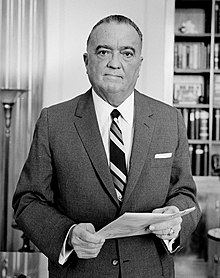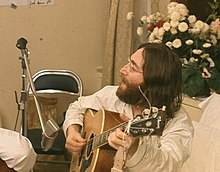Jon Wiener
[2] His most recent book is Set the Night on Fire: L.A. in the Sixties, a Los Angeles Times bestseller co-authored by Mike Davis.
[6][2] Wiener played a key role in efforts to expose the surveillance, as well as the behind-the-scenes battling between the government and the former Beatle, and is an expert on the FBI-versus-Lennon controversy.
[13] He graduated from Central High School and then attended Princeton University where he founded a chapter of the Students for a Democratic Society to protest the Vietnam War.
[14] He received a bachelor's degree from Princeton in 1966,[2][14] and earned a Ph.D. from Harvard, where he worked with Barrington Moore, Jr. and Michael Walzer, and also wrote for the underground paper The Old Mole.
[16][17][18] Since 1984, Wiener has been a contributing editor for The Nation magazine,[19] where he has written about diverse topics including campus issues, intellectual controversies, and southern California politics.
In his journalism, Wiener, writing in the Los Angeles Times at the beginning of 2020, correctly predicted that 2020 would be "The Worst Year of Trump’s Life.
[39] In the late sixties, many young Americans became opposed to the Vietnam War, and John Lennon became an antiwar advocate who made then-president Richard Nixon nervous about his reelection prospects in 1972.
[32] The Immigration and Naturalization Service, acting on a suggestion from Senator Strom Thurmond,[41] and probably at the behest of Richard Nixon, ordered Lennon to be deported in the spring of 1972.
[40] Numerous friends, including folk singer Bob Dylan,[44] wrote letters to the Immigration and Naturalization Service advocating that Lennon should be allowed to stay.
[32] While Wiener lost many of the early "skirmishes", a turning point came in 1991 when the 9th Circuit appeals court ruled in his favor, and declared that the FBI had failed to provide "adequate grounds" to keep the data secret.
[49] Wiener wrote: I doubt that Tony Blair's government will launch a military strike on the U.S. in retaliation for the release of these documents ... Today, we can see that the national security claims that the FBI has been making for 25 years were absurd from the beginning.Wiener expressed amazement that so much of the information had been withheld: One of the items here is a report from an undercover agent on a meeting of anti-war radicals in the East Village ...
Why should this be classified "confidential"?Wiener wrote about his legal battles in his book, Gimme Some Truth: The John Lennon FBI Files, published by the University of California Press in 2000.
ACLU attorney Mark Rosenbaum said that the Wiener v FBI case revealed "government paranoia at a pathological level and an attempt to shield executive branch abuse of civil liberties under the rubric of national security.
In addition to his co-authored 2020 book Set the Night on Fire: L.A. in the Sixties, Wiener also wrote Historians in Trouble: Plagiarism, Fraud and Power in the Ivory Tower.
[59] he examined various academic scandals and concluded that media spectacles end careers only when powerful, usually right-leaning external groups demand punishment.
[63][64][65][66] Kirkus Reviews called Set the Night on Fire: L.A. in the Sixties "a richly detailed portrait of a city that seethed with rebellious energy.








